Unit2
unit 2 单词(完整)
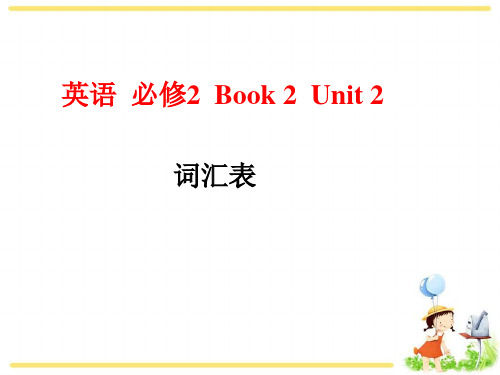
1.容许,准许……进(加)入 a.Only one hundred boys are admitted to/into
the school every year.
每年学校准许100名男生入校。
b.He is admitted as a member of the basketball team.
他被接受成为篮球队的一名队员。
4. take part in 参加;参与
They often _____ take _____ part ____ in outdoor
activities.
他们经常参加室外活动。
take part in join in join
参加活动,并在其中起 积极作用 参加小规模的活动如 “球赛、游戏”等 加入某人或某个组织成 为其中一员 参加会议、婚礼、典礼; 听报告、讲座
英语 必修2 Book 2 Unit 2
词汇表
1. ancient ['eɪnʃ(ə)nt] adj. 古代的.古老的 2. compete [kəm'piːt]vi. 比赛;竞争
petitor [kəm'petɪtə]n. 竞争者
The cycle of learning vi. 比赛;竞赛 compete [kəmˈpi:t] competitive [kəmˈpetətɪv] adj.竞争的 n. 比赛,竞赛 competition [ˌkɒmpəˈtɪʃn]
stand by sb.
反对
支持某人
辞职
stand out stand against
stand down
袖手旁观,支持
显眼,突出
7. △ mascot ['mæ skɒt] n 吉祥物
Unit 2 知识点提要

8A Unit 2 知识点提要一、词汇1.广告可n. advertisement ▲(an/-s)2.英国的adj. British3.美国的adj. American4.饼干可n. <英> biscuit (a/-s)、<美> cookie (a/-s)5.卡车可n. <英>*lorry ▲(a/lorries)、<美> truck (a/-s)6.橡皮可n. <英> rubber (a/-s)、<美>eraser ▲(an/-s)7.足球可n. <英> football (a/-s)、<美> *soccer (a/-s)8.假期可n. <英> holiday (a/-s)、<美> vacation (a/-s)9.秋天可n. <英> autumn (a/-s)、<美> fall (a/-s)下落;跌倒;倒塌↓v. fall→三单:-s →▲过去式:fell →▲现分:-ing10.商店可n. <英> shop (a/-s)、<美> store (a/-s)11.院子可n. <英> garden (a/-s)、<美> y ard (a/-s)12.电影可n. <英> film (a/-s)、<美> movie (a/-s)[典型例题]( ) 1. People in the UK say biscuit while people in the USA say ______.A. cakeB.cookieC.eraserD.soccer( ) 2. Which sentence is likely (可能) to be spoken by Americans?A. David Beckham is a popular soccer star.B. The shop sells different kinds of biscuits.C. It doesn’t rain often in this city in autumn.D. The film is very popular.( ) 3. If you are an Englishman, you may say “__________ ”A.I want some cookies.B. Autumn is coming.C. Can I borrow your eraser?D. He often plays soccer with his friends.13.男女混合的,混合的adj. *mixed★一所混合学校a mixed school混合v.8AU4mix →▲三单:-es →过去式:-ed →现分:-ing把A与B混合mix A with B把...混合在一起8AU4mix ... together14.法语不可n. &法国人可n.(a/-s) &法国(人)的adj.8BU4French法国可n. France (a/-s) 常用单数15.外国的adj. foreign (not in or from your own country)外国人可n. foreigner (a/-s)16.语言可n. language (a/-s) (words used in speaking and writing)区分:青少年可n. *teenager (a/-s)17.在…期间prep. during18.讨论,议论v. discuss (talk about something)→▲三单:-es →过去式:-ed →现分:-ing★与某人讨论某事discuss sth. with sb.讨论可n.8BU5 discussion (a/-s)19.在课堂上(短语)in class20.<口>家伙可n. *guy (a/-s)21.<口>好朋友;搭档可n.*buddy ▲(a/buddies)22.主动提出,自愿给予v. offer (give something to someone)→三单:-s →过去式:-ed →现分:-ing★为某人提供某物(2种)offer sth. to sb.= offer sb. sth.★给某人某物(2种)give sth. to sb.= give sb. sth.23.结束v. end →三单:-s →过去式:-ed →现分:-ing终止;末尾;终点可n.7BU8end (a/-s)24.棒球可n. baseball (a/-s)25.赢得;赢,获胜v. win (be best or first in a competition)→三单:-s →▲过去式:won →▲现分:winning获胜者可n. winner (a/-s)26.最少的;最小的adj. (little的最高级) least27.至少,不少于(短语)at least28.至多,不超过(短语)at most29.较远(的)/更远(的) adj.&adv. (far的比较级) farther/further★further常考固搭(5种)进一步学习/研究further study/ research 进一步讨论further discussion更多的信息further information 其他的问题further questions再往前/下走8BU3further on/ down30.最远(的) adj.&adv. (far的最高级) farthest/furthest31.花费(时间或金钱) v. spend →三单:-s →▲过去式:spent →现分:-ing★★★★★“花费”公式(4种)It/事takes/took sb. 时间段to do sth.人spend(s)/spent时间段/金钱on sth.(in) doing sth.人pay(s)/paid(金钱)for sth.物cost(s)/cost sb. 金钱(A.takes; spendsB. takes; costsC. costs; costsD. spends; takes( )2. [基础题]The trip to the zoo _______ us about one hour by underground yesterday.A. paidB. tookC. spentD. cost( )3. [易错题]This dress is too expensive, it ____ me 2000 yuan.A.takesB. spendsC. paysD. costs( )4. [难题]He tries to spend as much time as he can ____ computer games.A. playB. playsC. playingD.to play32.制服可n. *uniform ★(a/-s)穿校服wear a school uniform= wear school uniforms33.国际象棋不可n. chess34.每日的,日常的adj.&日报n. daily35.每周的adj. weekly36.快的adj. quick 比较级:-er 最高级:the -est快地adv. quickly比较级:more ~ 最高级:the most ~慢的adj. slow 比较级:-er 最高级:the -est慢地adv. slowly比较级:more ~ 最高级:the most ~37.自始至终,从头到尾&(内部)穿过7BU6 prep. th r ough区分:though/although prep. 尽管thought v. 认为(think的过去式)38.浏览,快速查看(短语)look through39.真实的,真的adj. real真实地;确实,的确adv. really40.起初,首先(短语)at first41.继续/重复做某事(短语)keep (on) doing sth.[拓展] “继续做某事”(4种)keep (on) doing sth.= continue doing sth.= carry on doing sth. = carry on with sth.42.完成;结束v. finish →▲三单:-es →过去式:-ed →现分:-ing★完成做某事finish doing sth.43.午餐时间不可n. lunchtime★在午餐时间at lunchtime44.物理(学) 不可n. physicsPhysics _______ (be) a useful subject, the student must learn it wisely and well.45.羽毛球运动不可n. *badminton[总结] ★★★常考冠词题play+球类、棋、牌、中国乐器 e.g. play baseball/badminton/chess/cards/erhu(二胡) play the+西洋乐器 e.g. play the piano/violin/guitar/drums(鼓)46.理想的adj. *ideal★一所理想的学校an ideal school区分:想法,主意,思想可n. idea▲(an/-s)二、语言点1.(某人)为什么不做某事Why don’t/doesn’t/didn’t sb do sth. =why not do sth.2.like作动词意为“喜欢”,作介词意为“像”(无时态、人称、数的变化)be like 像;look like 看起来像像做某事be like doing sth.—What is your school life like?—It is like _______ (live) in a big garden.( ). Tom, _____ his brother, _____ playing basketball after school.A.like; likesB. like; likeC. likes; likesD. likes; like3.little “几乎没有”,修饰不可n. a little “有一些”,修饰不可n.few “几乎没有”,修饰可n.复 a few“有一些”,修饰可n.复4.你想要做某事吗?Would you like to do sth. ?肯定回答:Yes, I’d like/love to. 否定回答:I’d like/love to, but……5.做某事玩得开心have a good/great/nice/lovely/wonderful/fantastic time doing sth.有很多much/lots of/a lot of没有have no有更多时间做某事more time to do sth.有更少less有一段some time[典型例题]( )1. —Hey, guys. Do you often have a good time _____ after-school activities?—Of course, we do. And we always have a lot of time_____ soccer.A. to do; to practiseB. doing; to practiseC. to do; practisingD. doing; practising( )2.Amy had a lovely time ____ one place after another in Shanghai and she had much time _____ the city.A. to visit; to enjoyB. visiting; to enjoyC. to visit; enjoyingD. visiting; enjoying( )3.Linda had a great time ____ with her friends, and they also had some time ____ about their studies last weekend.A.to talk; to talkB. to talk; talkingC. talking; to talkD. talking; talking6.练习做某事practice doing sth.( )1. My brother enjoys __________ the piano in the music room.A.practice playingB. practice playC. practicing playingD. practice to play( )2. The two girls always have a good time ________ the piano together.A.practice to play B.to practice to play C.to practice playing D.practicing playing( )3. [难题]We should spend as much time as we can __________ English every day.A. practice speakingB. practice to speakC. on practicing speakingD. practicing speaking7.给某人买某物buy sth. for sb.= buy sb. sth.8.在几年级(2种)in Year/Grade+基数词= in the+序数词+year/gradee.g. 在八年级______________________= ______________________(思考:如果改用阿拉伯数字呢?)9.单个动名词作主语,谓语动词用单数As we all know, using public chopsticks ________ (be) necessary when we eat with others.10.“借”(3种)borrow/borrowed 借入borrow sth. from sb.从某人那借来某物lend/lent 借出lend sth. to sb.= lend sb. sth.把某物借给某人keep/kept 借用keep sth. for+时间段借用某物一段时间How long提问①(for)+时间段①since +时间点①since 从句How soon提问in +时间段How far提问路程①实际距离 e.g.500 metres①s’ walk/ ride /drive /flight(航行) /bus ride /car ride/ train ride①时间段+交通方式e.g. 15 minutes by bus How often提问频率①次数+a+时间单位 e.g. twice a week①every+时间单位 e.g. every day③频度副词7个:always总是、usually通常、often经常、sometimes有时、seldom很少、hardly几乎不、never从不( )1—How far is it from your home to your school? —________.A.On foot B.I can take a bus there C.It’s about half an hour D.About ten minutes’ walk( )2.— How long have you had the bike? — ______ two years. A.in B.until C.since D.for ( )3.— How soon will these waste bottles be recycled?—_________. I have called the recycling company. A.For an hour B.An hour ago C.After an hour D.In an hour( )4.—_________ do you go to the concert? — Always, because I’m interested in it.A.How longB. How soonC. How oftenD. How far( )5. —________ is it from here to your home town? — Well, it takes over three hours to get there by coach. A. How soon B. How much C. How long D. How far( )6.—________do you have after-school activities? —Twice a week.A.How long B.How far C.How often D.How soon( )7. [易错题]—________ do you hear from your parents a week? —At least twice a week.A. How many timesB. How soonC. How oftenD. How long12.一篇由一个美国男孩写的文章an article (written) by a boy from the USA13.the number of…“…的数量”作主语,谓V.用单数;a number of…“许多”作主语,谓V.用复数( ). —A number of volunteers ________ willing to teach in China’s rural areas(农村地区).—Yes, the number of them _______ getting ________.A. is; are; more and moreB. are; is; larger and largerC. is; is; bigger and biggerD. is; are; more and more14.提问数量的句型(2种)What’s the number of the students in your class?=How many students are there in your class?15.seem“似乎”用法(3种)①seem (to be)+adj. ②seem to do sth. ③It seems that+从句16.[难点]need作动词的2种用法若need是情态动词,need do sth. ; 若need是实义动词,need to do sth.解题关键:如何判断need是情态动词还是实义动词?法一:看三单__________________ 法二:看否定__________________ 法三:看提问__________________ ( )1. Millie ______ her homework at the moment.A. needs not finishB. doesn’t need finishC. need not to finishD. doesn’t need to finish( )2. You needn’t ______ those things if you ______ them.A.buy; needn’tB.to buy; don’t needC.buy; don’t needD.to buy; needn’t( )3. —Does he need ______ there at once ? —No, he ______ leave so hurriedly because he has enough time.A. to go; needB. go; needn’tC. to go; needn’tD.go; doesn’t need17.代词it/one(s)的区分:it同类且同物、one(s)同类不同物( ). —The black dress doesn’t look nice on me. I don’t like _____ at all. —How about the blue _____?A.one; one B.it; one C.it; it D.one; it18.Each of(√);every of(×)19.Each of us ________(have) a book. We each ________(have) a book.20.有一个星期的假期have a week off21.★对每科进行一次月考have a monthly test on each subject22.我的日常生活my daily life23.有很多时间参加课外活动have lots of time for after-school activities24.★有一小时的家庭作业have an hour of homework25.★进行一次学校旅行(2种)go on/for a school trip26.★停止做某事(同一件事)stop doing sth. 停下来去做某事(另一件事)stop to do sth. ( )1. We have worked so long. Let’s stop ______ a rest.A.have B.to having C.having D.to have( )2.My father told me a funny joke and I can’t stop ________ every time I think of it.A.to laugh B.laughing C.from laughing D.Laughmore+可n.复/不可n.+than 比…多less+不可n.+than 比…少fewer+可n.复+than 比…少the most+可n.复/不可n.最多the least+不可n.最少the fewest+可n.复最少。
unit 2知识点
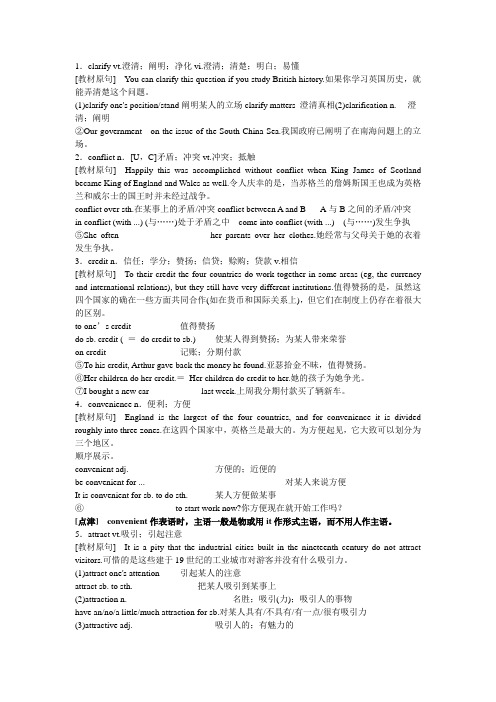
1.clarify vt.澄清;阐明;净化vi.澄清;清楚;明白;易懂[教材原句]You can clarify this question if you study British history.如果你学习英国历史,就能弄清楚这个问题。
(1)clarify one's position/stand阐明某人的立场clarify matters 澄清真相(2)clarification n. 澄清;阐明②Our government on the issue of the South China Sea.我国政府已阐明了在南海问题上的立场。
2.conflict n.[U,C]矛盾;冲突vt.冲突;抵触[教材原句]Happily this was accomplished without conflict when King James of Scotland became King of England and Wales as well.令人庆幸的是,当苏格兰的詹姆斯国王也成为英格兰和威尔士的国王时并未经过战争。
conflict over sth.在某事上的矛盾/冲突conflict between A and B A与B之间的矛盾/冲突in conflict (with ...) (与……)处于矛盾之中come into conflict (with ...) (与……)发生争执⑤She often her parents over her clothes.她经常与父母关于她的衣着发生争执。
3.credit n.信任;学分;赞扬;信贷;赊购;贷款v.相信[教材原句]To their credit the four countries do work together in some areas (eg, the currency and international relations), but they still have very different institutions.值得赞扬的是,虽然这四个国家的确在一些方面共同合作(如在货币和国际关系上),但它们在制度上仍存在着很大的区别。
必修二unit2单词表
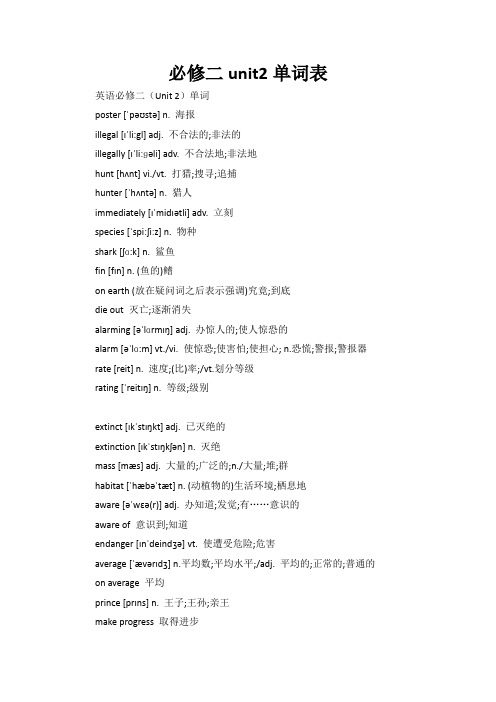
必修二unit2单词表英语必修二(Unit 2)单词poster [ˈpəʊstə] n. 海报illegal [ɪˈli:gl] adj. 不合法的;非法的illegally [ɪˈliːɡəli] adv. 不合法地;非法地hunt [hʌnt] vi./vt. 打猎;捜寻;追捕hunter [ˈhʌntə] n. 猎人immediately [ɪˈmidɪətli] adv. 立刻species [ˈspiːʃiːz] n. 物种shark [ʃɑ:k] n. 鲨鱼fin [fɪn] n. (鱼的)鳍on earth (放在疑问词之后表示强调)究竟;到底die out 灭亡;逐渐消失alarming [əˈlɑrmɪŋ] adj. 办惊人的;使人惊恐的alarm [əˈlɑ:m] vt./vi. 使惊恐;使害怕;使担心; n.恐慌;警报;警报器rate [reit] n. 速度;(比)率;/vt.划分等级rating [ˈreitɪŋ] n. 等级;级别extinct [ɪkˈstɪŋkt] adj. 已灭绝的extinction [ɪkˈstɪŋkʃən] n. 灭绝mass [mæs] adj. 大量的;广泛的;n./大量;堆;群habitat [ˈhæbəˈtæt] n. (动植物的)生活环境;栖息地aware [əˈwɛə(r)] adj. 办知道;发觉;有……意识的aware of 意识到;知道endanger [ɪnˈdeindʒə] vt. 使遭受危险;危害average [ˈævərɪdʒ] n.平均数;平均水平;/adj. 平均的;正常的;普通的on average 平均prince [prɪns] n. 王子;王孙;亲王make progress 取得进步concern [kənˈsɜːn] vt. 涉及;让……担忧concerned [kənˈsɜːnd] adj. 担心的;关切的concerned about 对……关切的;为……担忧的living [ˈlɪvɪŋ] adj. 居住的;活的;在用的;n./生活;生计adapt [əˈdæpt] vi.适应;/vt. 使适应;使适合adapt to 适应measure [ˈmɛʒə] n.措施;方法;/vt. 测量;度量;估量authority [ɔːˈθɒrəti] n. 官方;权威;当权pressure [ˈprɛʃə] n. 压力;要求under pressure 在承受压力whale [wel] n. 鲸antelope [ˈæntɪləʊp] n. 羚;羚类动物Tibetan antelope 藏羚羊reserve [rɪˈzɜːv] n.保护区;储藏(量);/vt. 预订;预留;保留plain [plein] n.平原; /adj. 简单明了的;直率的;平凡的make out 看清;听清;分清herd n.牧群;兽群observe [əbˈzɜːv] n. 观察(到);注视;遵守beauty [ˈbju:ti] n. 美;美人;美好的东西remind [rɪˈmaɪnd] vt. 提醒;使想起remind sb of sb/sth 使某人想起(类似的人或物)fur [fɜː] n. 毛(皮); 毛皮衣服herb [hɜːb] n. 兽群sacred [ˈsekrɪd] adj. s神圣的;受尊敬的shoot [ʃut] vt./vi. (shot,shot) 杀;射伤;发射profit [ˈprɑfɪt] n. 利润;利益watch ove 保护;照管;监督day and night 日日夜夜;夜以继日attack [əˈtæk] n./vi./vt. 攻击;抨击effective [ɪˈfɛktɪv] adj. 有效的;生效的recover [rɪˈkʌvə] vt. 恢复;康复;找回;寻回remove [rɪˈmuv] vt. 去除;移开;脱去intend [ɪnˈtɛnd] vi./vt. 打算;计划;想要threat [θrɛt] n. 威胁threaten [ˈθrɛtn] vt. 威胁;危及exist [ɪɡˈzɪst] vi. 存在;生存harmony [ˈhɑrməni] n.和谐;融洽goods [ɡʊdz] n. 商品;货物creature [ˈkritʃə] n. 生物;动物deer [dɪr] n. 鹿kangaroo [ˌkæŋɡəˈru:] n. 袋鼠reduce [rɪˈdjʊs] vt. 减少due [dju] adj. 由于;因为due to 由于;因为insect [ˈɪnsɛkt] n.昆虫net [nɛt] n.网(=Internet);/adj. 净得的;纯的neighbourhood [ˈneɪbərhʊd] n. 临近的地方;街区binoculars [bɪˈnɑkjəlɚz] n.b双筒望远镜bird field guide 鸟类图鉴search for 捜索;查找dolphin [ˈdɒlfɪn] n. 海豚Yangtze River dolphin 白鳍豚koala [kəʊˈɑ:lə] n. 树袋熊;考拉stir [stɜː] vt. 激发;搅动stir up 激起emotion [ɪˈməʊʃən] n. 感情;情感;情绪skin [skɪn] n. 皮;皮肤unusual [ʌnˈjʊʒʊəl] adj. 特别的;不寻常的Tibetan /tɪ’betn/ adj 西藏的; 藏语的; 藏族(人)的n.西藏人; 藏族人; 藏语Tibet /tɪ’bet/ n.西藏。
学术英语(社科)Unit2二单元原文及翻译
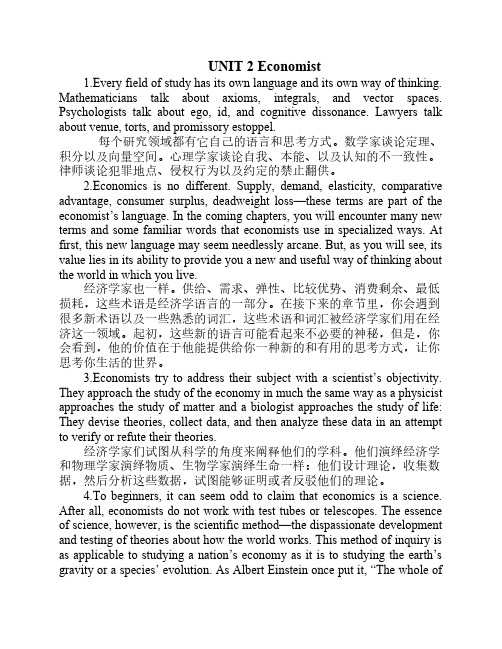
UNIT 2 Economist1.Every field of study has its own language and its own way of thinking. Mathematicians talk about axioms, integrals, and vector spaces. Psychologists talk about ego, id, and cognitive dissonance. Lawyers talk about venue, torts, and promissory estoppel.每个研究领域都有它自己的语言和思考方式。
数学家谈论定理、积分以及向量空间。
心理学家谈论自我、本能、以及认知的不一致性。
律师谈论犯罪地点、侵权行为以及约定的禁止翻供。
2.Economics is no different. Supply, demand, elasticity, comparative advantage, consumer surplus, deadweight loss—these terms are part of the economist’s language. In the coming chapters, you will encounter many new terms and some familiar words that economists use in specialized ways. At first, this new language may seem needlessly arcane. But, as you will see, its value lies in its ability to provide you a new and useful way of thinking about the world in which you live.经济学家也一样。
Unit 2 课文中英文
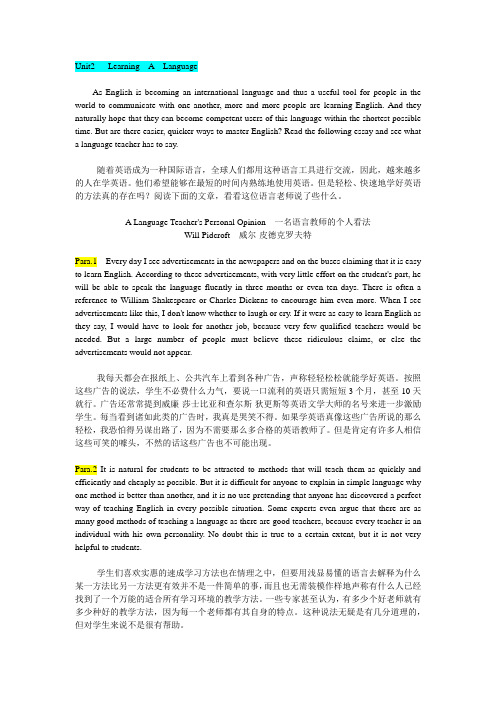
Unit2 Learning A LanguageAs English is becoming an international language and thus a useful tool for people in the world to communicate with one another, more and more people are learning English. And they naturally hope that they can become competent users of this language within the shortest possible time. But are there easier, quicker ways to master English? Read the following essay and see what a language teacher has to say.随着英语成为一种国际语言,全球人们都用这种语言工具进行交流,因此,越来越多的人在学英语。
他们希望能够在最短的时间内熟练地使用英语。
但是轻松、快速地学好英语的方法真的存在吗?阅读下面的文章,看看这位语言老师说了些什么。
A Language Teacher's Personal Opinion 一名语言教师的个人看法Will Pidcroft 威尔·皮德克罗夫特Para.1 Every day I see advertisements in the newspapers and on the buses claiming that it is easy to learn English. According to these advertisements, with very little effort on the student's part, he will be able to speak the language fluently in three months or even ten days. There is often a reference to William Shakespeare or Charles Dickens to encourage him even more. When I see advertisements like this, I don't know whether to laugh or cry. If it were as easy to learn English as they say, I would have to look for another job, because very few qualified teachers would be needed. But a large number of people must believe these ridiculous claims, or else the advertisements would not appear.我每天都会在报纸上、公共汽车上看到各种广告,声称轻轻松松就能学好英语。
高一英语必修二unit2知识点总结
高一英语必修二unit2知识点总结高一英语必修二Unit 2 知识点总结Unit 2主要涵盖了有关世界文化遗产的话题。
通过学习本单元,我们能够了解到不同文化背景下的重要历史遗迹以及它们对人类文明的贡献。
以下是本单元的重点内容总结:1. 了解文化遗产(Understanding cultural heritage)- 文化遗产是指由过去文明所留下来的具有历史、艺术和社会意义的物质和无形的遗产。
- 文化遗产可以是建筑物、古迹、艺术品、传统技艺、习俗和传统节日等等。
2. 介绍著名的文化遗产(Introducing famous cultural heritage)- 了解著名文化遗产的历史背景和重要性,如埃及金字塔、泰姬陵、中国长城等。
- 学习描述文化遗产的词汇和短语,如古老的、壮丽的、独特的等。
3. 学习被动语态(Passive Voice)- 被动语态用于强调动作的接受者,或者说不知道动作的执行者是谁。
- 被动语态的构成:be+过去分词,根据时态和语态的要求进行相应的变换。
4. 阅读技巧(Reading Skills)- 学习如何通过阅读理解文章中的关键信息。
- 注意上下文和词汇的联系,利用上下文猜测词义。
5. 语法重点(Grammar Focus)- 学习并掌握几种非谓语动词形式的用法,如动名词、不定式和分词。
- 注意非谓语动词在句子中的作用和与其他成分的搭配。
6. 扩展阅读(Extensive Reading)- 阅读有关世界文化遗产的文章,拓宽对于世界各地文化的了解。
- 提高阅读理解技巧,增加词汇量。
7. 写作技巧(Writing Skills)- 学习如何写一篇关于世界文化遗产的文章,介绍其历史和重要性。
- 注意文章的结构,包括引言、主体和结论,并适当使用连接词使文章连贯。
以上是关于高一英语必修二Unit 2的知识点的总结。
通过学习这些内容,我们能够更好地了解世界各地的文化遗产以及它们的重要性。
大学英语精读第二册课件Unit2
Unit 2Part I New Wordsdeclaration n. 宣布,宣告,宣言,声明a declaration of independence 独立宣言The government will issue a formal declaration tomorrow. 政府将于明天发布正式声明。
declare v. 断言,宣称He declared (that) he was right. 他力陈他是对的。
He declared his true feelings to her. 他向她表白了自己的真实感情。
independence n. 独立;自主;自立I've always valued my independence. 我一向很重视自己的独立。
I-Day 美国独立纪念日(7月4日)Young people have more independence these days. 现在的年轻人更加独立自主。
independent a. 自主的;独立的India became independent in 1947. 印度于1947年独立。
I wanted to remain independent in old age. 我希望年老时还能自给自足(独立生活)。
obtain v. 得到,获得;行,得到公认,应用Where can I obtain the book? 我在哪里能买到(得到)这本书?These ideas no longer obtain. 这些见解已经行不通了。
Different laws obtain in different places. 不同的法律适用在不同的地方。
besides prep./ad. 除…以外(还);而且,也He had other people to take care of besides me. 除了我以外, 他还需要照料其他人。
I don't want to go; besides, I'm too tired. 我不想去, 再说我也太累了。
人教七年级下册英语unit2知识点总结
人教七年级下册英语unit2知识点总结Unit 2知识点总结Unit 2主要介绍了有关学校和课程的相关话题,包括学科名称、教室设施、课程时间和日常学习及校外活动等内容,下面我们来一一进行总结。
一、学科名称1. 英语 - English2. 数学 - Math3. 历史 - History4. 科学 - Science5. 美术 - Art6. 音乐 - Music7. 体育 - P.E.8. 计算机 - Computer Science二、教室设施1. 黑板 - blackboard2. 白板 - whiteboard3. 投影仪 - projector4. 音响 - sound system5. 地图 - map6. 水龙头 - tap7. 电视 - TV8. 电脑 - computer9. 灯 - light10. 窗户 - window三、课程时间1. 上午 - in the morning2. 下午 - in the afternoon3. 晚上 - in the evening4. 早上 - in the early morning5. 夜晚 - at night6. 每周 - every week7. 每天 - every day8. 周末 - on weekends四、日常学习1. 做作业 - do homework2. 练习 - practice3. 复习 - review4. 读书 - read books5. 写作 - write compositions6. 讨论 - have discussions7. 板书笔记 - take notes8. 教师讲解 - teacher's explanation9. 学习笔记 - study notes10. 做练习 - do exercises五、校外活动1. 课外活动 - extracurricular activities2. 运动会 - sports meeting3. 聚会 - party4. 社交活动 - social activities5. 英语角 - English corner6. 爱好小组 - hobby group7. 社团活动 - club activities8. 学校之旅 - school trip以上就是Unit 2的主要内容,希望能够帮助大家更好地学习英语,更好地了解学校和课程的相关话题。
Unit 2 单词课件
a happy bunny
•Someone who is happy or
content. Often used in the negative
to indicate someone who is particul arly unhappy or displeased. 快乐的 人
• I just got a raise, so I'm a happy b unny today.
23. complain [kəmˈpleɪn] v.抱怨,不满,发牢骚 n. complaint 抱怨 complain (to sb.) (about/of sth.)抱怨;埋怨;发牢骚 =make a complaint to sb. about/of sth eg:The American people complained about the high cost of visiting Europe.
• This stamp of the rabbit designed by Huang Yongyu has caused quite a stir online for its “bizarre and almost disturbing” blue skin and red eyes.
Stamps of Chinese zodiac
• genre n. 体裁,类型 • meet the demand 满足需求 (make ends
meet [?]) • 区: cope with the demand / meet the
demand
TV Drama makes a hit
The Knockout
• The drama tells the story of a police officer's fight against organized crime for over 20 years, and shows the rise and demise of underworld figures and corrupt officials.
- 1、下载文档前请自行甄别文档内容的完整性,平台不提供额外的编辑、内容补充、找答案等附加服务。
- 2、"仅部分预览"的文档,不可在线预览部分如存在完整性等问题,可反馈申请退款(可完整预览的文档不适用该条件!)。
- 3、如文档侵犯您的权益,请联系客服反馈,我们会尽快为您处理(人工客服工作时间:9:00-18:30)。
Unit
2
Express Yourself!
Lesson A Feelings Lesson B Feelings and emotions
An English Video Course 2 视听说教程(第三版)电子教案 2
Listening Activity 1 Why are you smiling? A Listen to three conversations. Number the pictures 1, 2, or 3 in the order you hear.
II
■
3
1
2
Unit
2
Express Yourself!
Lesson A Feelings Lesson B Feelings and emotions
An English Video Course 2 视听说教程(第三版)电子教案 2
Listening Activity 1 Why are you smiling? B Listen again. How does each speaker feel? Complete the sentences with the correct adjectives.
smile laugh yell blush cry frown
is smiling . 1. The woman in the red coat ________ 2. The woman in the blue jeans _________ is laughing . 3. The child on the bus ________ is crying . 4. The businessman _________ is blushing . 5. The cab driver ________ is yelling . is frowning . 6. The driver in front of the cab _________
Unit
2
Express Yourself!
Lesson A Feelings Lesson B Feelings and emotions
An English Video Course 2 视听说教程(第三版)电子教案 2
Listening Activity 2 What are they doing?
Vocabulary Link In the neighborhood How do they feel? A Pair work. How do these people feel? Match a word in the box with a person in the picture. Take turns telling your partner.
Unit
2
Express Yourself!
Lesson A Feelings Lesson B Feelings and emotions
Feelings 1. happy 2. bored 3. angry 4. nervous 5. sad 6. scared 7. embarrassed
The woman in the red coat is happy.
Key
2. The man in the coffee shop is bored. 3. The taxi driver is angry. 4. The man in the red car is nervous.
An English Video Course 2 视听说教程(第三版)电子教案 2
Listening Activity 1 Why are you smiling? C Pair work. Take turns to ask your partner questions:
What makes you happy / sad / nervous? When you’re sad or angry, do you cry? When you are nervous, what do you do?
5. The girl on the bus is sad. 6. The young girl is scared. 7. The businessman is embarrassed.
Unit
2
Express Yourself!
Lesson A Feelings Lesson B Feelings and emotions
II
■
A: The _____ woman inin the the ____ red ____ coat is is smiling _____ and andthe the_____ woman in the in the ____ blue ____ jeans beside her is laughing. beside her is laughing. Why are Why they _____ are sothey _____? _____ so happy ____ ? happy? B: B : Maybe May be _____ they’re they’re they’re ______ going goingto to _____ the themovies ____ the movies and and they they and are are ____ excited excited _____ . . ______.
Unit
2
Express Yourself!
Lesson A Feelings Lesson B Feelings and emotions
An English Video Course 2 视听说教程(第三版)电子教案 2
Vocabulary Link In the neighborhood How do they feel? C
Unit 1 All About Me Unit 2 Express Yourself! Unit 3 Let’s Eat! Unit 4 Today’s Trends Unit 5 Unsolved Mysteries Unit 6 The Mind Unit 7 Let’s Celebrate! Unit 8 In the Neighborhood
An English Video Course 2 视听说教程(第三版)电子教案 2
Unit 2 Express Yourself!
Unit
2
Express Yourself!
Lesson A Feelings Lesson B Feelings and emotions
An English Video Course 2 视听说教程(第三版)电子教案 2
Unit
2
Express Yourself!
Lesson A Feelings Lesson B Feelings and emotions
An English Video Course 2 视听说教程(第三版)电子教案 2
Listening Activity 1 Why are you smiling? Language Notes Proper names Greenland 格陵兰岛(丹麦) Las Vegas 拉斯维加斯(美国城市 以其赌场闻名 俗称“大西洋赌城”) London 伦敦(英国首都) New words yawn n. 打哈欠
Listening Activity 2 What are they doing?
Language Notes Proper names Paula Connie Jen Mrs. Harris Anne Bill
Unit
2
Express Yourself!
Lesson A Feelings Lesson B Feelings and emotions
II
■
1. The woman is winking at / waving to her friend. 2. The two women are crossing their fingers / shaking hands . 3. The man is pointing at Anne / crossing his fingers. 4. The man is shrugging / winking.
An English Video Course 2 视听说教程(第三版)电子教案 2
Listening Activity 2 What are they doing? A Listen to the four conversations. What gestures are the people using in each? Complete the sentences with the correct answer.
II
■
1. Angie is nervous / bored . 2. Carolyn is scared / sad . 3. Vicki is happy / angry.
Unit
2
Express Yourself!
Lesson A Feelings sson B Feelings and emotions
An English Video Course 2 视听说教程(第三版)电子教案 2
Vocabulary Link In the neighborhood How do they feel? B Look at the picture again. What are the people doing? Complete the sentences. Use the correct form of the verbs in the box.
